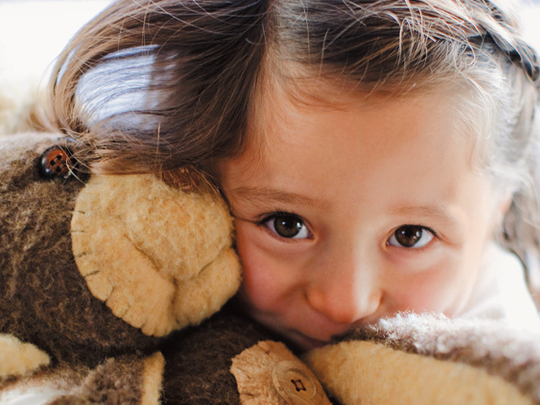
One of the most enjoyable things about being a parent is watching your child's personality develop. My daughter has a wildly adventurous streak, which I respect and admire, but fear having to reign in once she hits teenage-dom.
My son is the complete opposite. He likes his duvet cover straight and flat when he's going to sleep. He's particular about his clothes being neat and tidy and he couldn't care less how much fun you say it is, there is no way he is climbing a tree.
You start looking for elements of their personality - their sense of humour, their kindness, their gentle nature - in yourself, in their father, in your great-aunt Fanny (oh yes, remember how she used to always make jokes?). These golden streaks in their character must have come from somewhere - they can't have developed of their own accord. They were there from the start - from the moment of conception. Looking at baby photos of our children recently, their father said, "I recognise that look on Jack's face, and now that I know him, I know what he was feeling at that moment." It's true and it's truly magical.
Then you stumble across a nasty streak and, suddenly, your theories change.
Listening to the (incessant) banter going on between my children recently, I've been wondering where the line is between sibling rivalry and downright bullying. One is six, one is three. One is more advanced in every way because she is twice his age. The other is constantly playing catch-up, constantly struggling to keep his head above the water of whatever game, conversation, or argument is occurring.
As the oldest child of four, I remember an entire childhood of winding each other up, ganging up on each other and driving our parents to distraction with bickering. And I'm all for it. But when there's only two, at this age it seems that the older one is always the ‘winner' while the younger one is always the ‘loser'. Will this not lead to an egomaniacal daughter and a son with an inferiority complex? And where did the bully streak come from? It certainly wasn't from me, her father, or great-aunt Fanny.
Amy Bailey is a psychologist at KidsFIRST Medical Centre (kidsfirst.ae), with experience in dealing with children with behavioural and emotional issues. She says, "Arguing with siblings is a normal part of family life. But a child's interactions with their siblings dictates how they will deal with the world in the future, in the sense of negotiating their roles and managing conflict. It could be that your daughter is just frustrated by dealing with a younger child who is not on her level yet."
This is true. Dealing with a whiny three-year-old can be annoying. But this still doesn't explain where she learnt these foul ways from. Turning the spotlight of honesty on myself, I called my mother and asked, "Was I a bully in my former life?"
Apparently not, she says (and I'm choosing to believe her). So where has it come from then? "She's no different from other kids," says my mother. "They're clever. She's older so she can exert her power. When he's older he will fight back. It's a hierarchy of power. Survival of the fittest."
This makes sense. She's being a bully because she can be. Us adults are guilty of this too, sometimes. Relieved that it is just circumstantial and not the awakening of a previously dormant nasty side to my little angel, I sat her down for a chat. As a result, she's being kinder to her brother, and when she does slip into her taunting ways, all it takes is a raised eyebrow to get her in check. This is the level of ‘normal' I was after.
I think back to Amy's advice on the situation. She says, "It's more about environment than genetics. Watch how you interact with them - if you're clinging on to the baby-ishness of the younger one, it could be causing jealousy." My mother agrees. She says, "Maybe she's a bit resentful of him taking the limelight with his whining and neediness."
Hmph. So, my daughter hasn't necessarily inherited it from me, but I still could be to blame for creating this ‘monster'. When it comes to our children's personality, it strikes me that us parents must learn how to accept responsibility for the negative as readily as we accept credit for the positive. And in turn accept that they may have bad sides, and that it's OK if they do, but perhaps they deserve some of the credit for their good sides, too.


